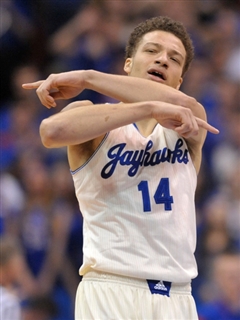
A few weeks ago, Kansas University men’s basketball player Brannen Greene dunked the basketball just before time expired in a contest against rival Kansas State.
Before the dunk, the KU Jayhawks were winning by 16.
(You can watch it here.)
KU head coach Bill Self called it “totally classless” and “probably the biggest dick move I’ve ever had a player do during a game.”
Other commentators note that “anyone who plays this game understands that you don’t do that when you’re up 16.”
Clearly, Greene violated a norm of basketball etiquette. There is no rule that says you cannot dunk at the end of games, so Greene was technically within the rules. But why does that norm—don’t dunk at the end of a blowout if you’re winning—exist?
The most likely explanation is probably that offered by Myron Medcalf—that when your team is up by 16 with a few seconds left, “the game is over.” Though not technically true, since the game is not officially over until the time is completely expired, underlying what Medcalf points out is that there are situations (like when your team is up 16 with a few seconds to play) where an adversarial athletic contest is constructively over because the final outcome of the contest cannot reasonably be doubted.
Greene knew, or should have known, that the game was constructively over before he dunked the ball.
When the game is over, we expect the competitors to realize that what constitutes proper (or perhaps “ethical”) behavior is no longer subject to the norms of competition. Before and after the contest, socially appropriate behavior is governed by ordinary conceptions of virtue. Ordinarily, we expect the persons who play basketball to have respect for others in a non-adversarial way, which may include being sensitive to the feelings of the players on the other team—or at least not purposely inflicting emotional distress upon a former adversary.
Simply put, we have different expectations for the actions of basketball players playing basketball compared to persons who play basketball. As Joseph Heath has (in my view, persuasively) argued, “the competitive environment licenses a greater range of ‘self-interested’ behavior.” However, choosing to remain in an adversarial role—remaining a basketball player rather than resuming life as a person who plays basketball—when the contest is constructively over is to abuse that limited license. At bottom, we regard as at least unsportsmanlike the choice to act as an adversary even when you are no longer engaged in competition.
And that choice is a dick move.

I appreciate the perspective and don’t necessarily disagree with you. However, I think we are going overboard by trying to protect the feelings of players at this level. In high school, I’d agree a little more, but these are some of our nation’s greatest athletes and they are all grown men with their big boy shorts on. Also I think it is somewhat unfair to ask players to play with as much passion and emotion as possible and then instantly turn it off at the point of a constructive win. Are there unwritten rules about winning with class? Absolutely. But there are also times when it is considered socially acceptable (and even desirable) to embarrass your opponent, i.e. rivalry games. So I think labeling Greene’s dunk categorically a “dick” move is overkill.
I dunno. Surely we all realize immediately that it’s a dick move. The only questions are “how dickish, on a scale of 1-to-10 is it?” and “what exactly is it that gives it its dickish qualities?” The poster is probably correct in labelling it an issue of “sports ETIQUETTE” more than “sports ETHICS”. It seems less about hurting the other players’ feelings than it is about the dunker himself losing all sight of what is great about sporting competitions. Great athletes wants to play against the best so that they each bring out the best in each other. It is about trying to win in that context, not about trying to make the others lose. The winner is entitled to feel glory in his or her accomplishment. But if he is mainly getting off on increasing his opponent’s agony, then he is selfishly indulging his own immature sense of schadenfreude. His opponents aren’t “hurt” by this, but they lose respect for him as a person and a competitor. In short, he hurts himself. Why? Because his inability to channel the emotions of a true athlete reveal to his opponents, his teammates, his coaches, his family members, and to countless spectators and viewers, that, well, he’s a dick. Or to put it more fairly, as his coach did, that he did a dick move. We’ve (almost) all done dickish things while growing up and playing sports. That doesn’t necessarily make us dicks. Unless we just don’t get it and can’t learn from these act of self-vandalism we scrawl all over our own reputations.
I’m wondering how the constructive game-over theory applies to running up the score. There are certainly games where elite schools are up by 30 or so points, but there are also ridiculous comebacks. At some point it becomes practically, approaching mathematically, impossible to lose a game, but I can imagine coaches running up the score (shooting 3-pointers, rather than just milking the clock) not to embarrass a rival program, but instead to avoid being on the losing end of a 30-point comeback. Even if comebacks like that haven’t happened recently, they happen. Can teams win with class while at the same time running up the score out of good faith caution?